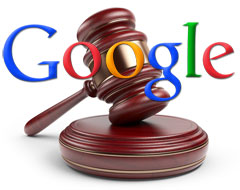Google Loses Again In AdWords Patent Infringement Case
A judge has determined patent-holding company Vringo is entitled to additional royalties from Google in a patent infringement case involving Google AdWords. The order stems from a case brought by Vringo subsidiary I/P Engine in 2011 that claimed filtering technology used in Google AdWords violated two of its patents. A jury found in favor of […]
 A judge has determined patent-holding company Vringo is entitled to additional royalties from Google in a patent infringement case involving Google AdWords.
A judge has determined patent-holding company Vringo is entitled to additional royalties from Google in a patent infringement case involving Google AdWords.
The order stems from a case brought by Vringo subsidiary I/P Engine in 2011 that claimed filtering technology used in Google AdWords violated two of its patents. A jury found in favor of I/P Engine, awarding it $30,496,155 and running royalty payments of 3.5 percent. The case is I/P Engine Inc. v. AOL Inc., 11cv512.
Google claimed to have updated the AdWords system in May 2013 in such a way that the patents were no longer applicable and said it should not be subject to royalty payments after that point.
In a Memorandum Order issued yesterday, U.S. District Judge Raymond A Jackson disagreed writing, the modified version of AdWords “is nothing more than a colorable variation of the infringing system.” As such Vringo is “entitled to ongoing royalties as long as Defendants continue to use the modified system.”
The 90’s era patents originate from Lycos. Vringo bought the two patents — 6,314,420 entitled “Collaborative/adaptive search engine” and 6,775,664 entitled “Information filter system and method for integrated content-based and collaborative/adaptive feedback queries”– and 6 others in June 2011. It filed suit against Google and its customers AOL, Gannett, IAC and Target in September of that year.
Vringo also sued Microsoft in 2013 using the same patents. Microsoft settled with the company.
Matt Kallman, a Google spokesperson told The Washington Post that the “decision further highlights the mischief trolls can make with the patent system.” Google is appealing the ruling.
Google is appealing the original ruling in the Court of Appeals for the Federal Circuit (I/P Engine Inc. v. AOL Inc., 14-1233). Google’s Kallman also said Google will likely be “seeking review of today’s decision as well.”
The excerpts below from the memorandum order provide more background on I/P Engine’s original trial argument regarding AdWords’ process for ad serving and the why the court found that the “new AdWords” of post-May 2013 was essentially the same as the “old AdWords” as it relates to the two patents:
At the trial in this case, I/P Engine’s infringement expert, Dr. Ophir Frieder, testified that old AdWords infringed I/P Engine’s patents at multiple points in the process of selecting which ads would be displayed for a given query. Specifically, this occurred at two so-called “disabling” steps and one “promotion” step, all of which occurred prior to the auction for ad space. Each step used a “predicted click-through rate,” a quality score based on the combination of content and collaborative data. The selection of ads based on this combination was Dr. Frieder’s central theory of infringement at trial. Ads, however, were not selected based only on this predicted click-through rate; instead, that score formed part of the “long term value,” or LTV score, which included data on the quality of the webpage, the minimum bid, and other factors. For an ad to proceed to the next step, it was required to have an LTV score greater than zero.
The Court has, however, thoroughly reviewed the experts’ descriptions of new AdWords and the ways in which it differs from old AdWords, and is confident that I/P Engine has shown that new AdWords is no more than a colorable variation of old AdWords. Suffice it to say that it is undisputed that new AdWords continues to use a candidate advertisement’s LTV score that includes a predicted click-through rate in the process of choosing which advertisement will ultimately be shown to the individual performing the query. The only differences between the two systems that are potentially relevant in light of I/P Engine’s theory of infringement at trial is that the LTV score is no longer used at the multiple steps just described, and occurs once at a different point in the process of selecting which advertisements will ultimately be shown to users.
I/P Engine has also proven that new AdWords, like old AdWords, infringes its patents by filtering based on the combination of collaborative and content data.”
Contributing authors are invited to create content for Search Engine Land and are chosen for their expertise and contribution to the search community. Our contributors work under the oversight of the editorial staff and contributions are checked for quality and relevance to our readers. The opinions they express are their own.
Related stories
New on Search Engine Land